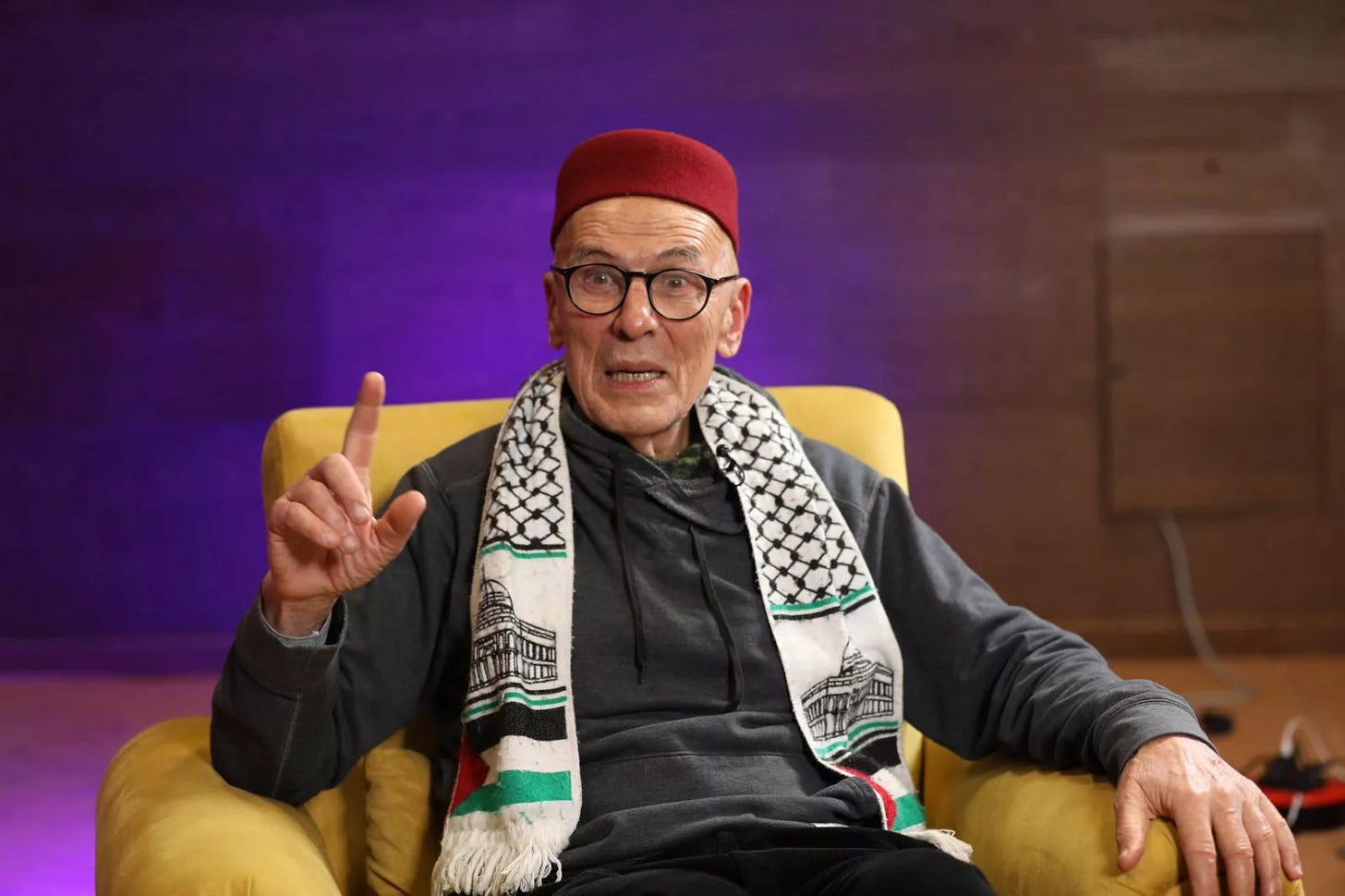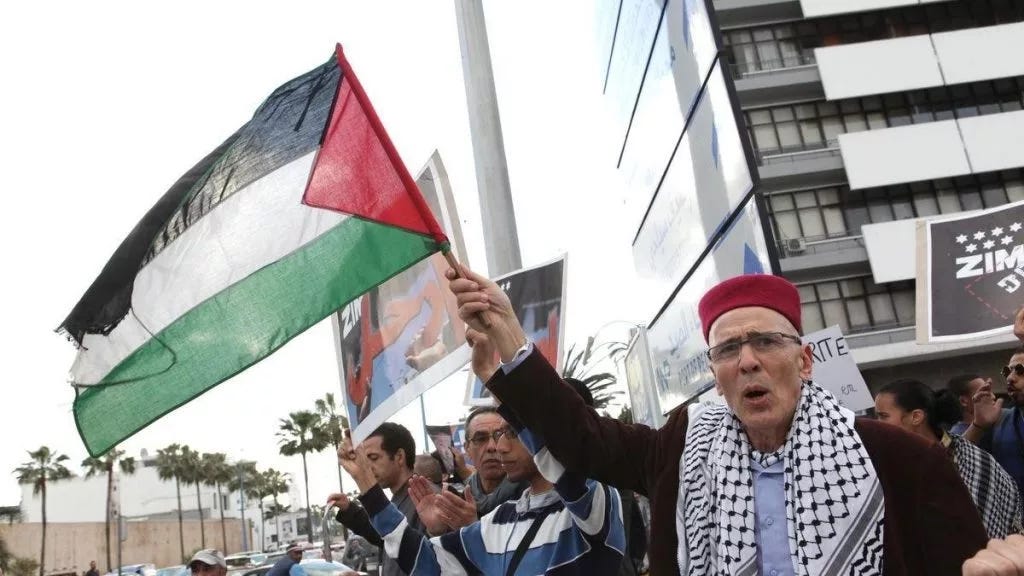Among the ranks of Moroccan Jewish anti-Zionist activists, the name Sion Assidon stands out as an exceptional figure. For decades, he has made the Palestinian cause the centerpiece of his human rights and political struggle, refusing to adopt the official narratives whether in Morocco or in “Israel.”
Assidon was born in Agadir just one day after David Ben-Gurion, then executive head of the World Zionist Organization and director of the Jewish Agency, declared the establishment of the “State of Israel” on Palestinian land following the end of the British Mandate.
From his youth, Assidon dreamed of the end of the occupation a dream that cost him his freedom when he was imprisoned during what Moroccans call the “Years of Lead.”
Despite imprisonment and persecution, he remained steadfast in his belief that resisting injustice regardless of its source or form is a moral duty that cannot be abandoned. This conviction established him as one of the most prominent voices for Palestine in North Africa, defying the Zionist narrative and resisting normalization efforts in his surroundings.
A Multi-Layered Identity
Sion Assidon was born on May 14, 1948, in Agadir to a Jewish Amazigh family, giving him a complex identity that blends Amazigh and Arab heritage, Jewish faith, and Moroccan cultural upbringing.
He received his primary education in his hometown, but the devastating 1960 earthquake that struck Agadir forced his family to relocate to Casablanca, where he continued his studies at the renowned Lycée Lyautey. In 1966, he left Morocco for France to study mathematics at the University of Paris.
There, Assidon was exposed to leftist thought and Marxist literature. He absorbed revolutionary ideas and took part in the May 1968 uprising that shook France an experience that laid the foundation for his emerging political consciousness.
Yet the most profound shift in his worldview came after the 1967 defeat of Arab forces, when the Western media’s unconditional support for “Israel” left a deep mark on him. It led him to question the Zionist version of Jewish history and to reconsider the roots of the Middle East conflict.
In the late 1960s, Assidon returned to Morocco, driven by a desire to help build a democratic and just homeland. In 1970, he co-founded the Marxist-Leninist movement “23 Mars,” which opposed the monarchy and took a strong stance against corruption and tyranny at a time when speaking freely often meant imprisonment or exile.
In 1972, he was arrested for his political activism and spent 12 years in prison on charges of “undermining state security,” alongside other opposition figures during what would later be called the “Years of Lead.”
After his release, he never abandoned his principles. Instead, he devoted himself to civil activism within Morocco. He founded the Moroccan branch of Transparency International and actively exposed corruption and public mismanagement, contributing to a growing culture of accountability.
For Assidon, the struggle against corruption and authoritarianism is inseparable from the defense of the Palestinian cause. Both, he believes, are rooted in systems of injustice, exclusion, and exploitation.
Palestine: The Heart of the Moral Struggle
Though deeply involved in Moroccan civic issues, Palestine was never a peripheral concern for Assidon. He saw it as a symbol of neo-colonialism and racial discrimination, and he viewed “Israel’s” actions displacement, killings, and settlement expansion as some of the most egregious forms of occupation in modern history.
Since his release from prison in 1984, he has become one of Morocco’s most vocal supporters of the Palestinian cause not out of sentimentality, but from a political and moral belief that Zionism is a colonial project built on erasure and exclusion.
Assidon is a staunch supporter of the Boycott, Divestment, Sanctions (BDS) movement, launched in 2005 as a peaceful and effective tool to support Palestinian resistance and resilience. He also founded the “Academic and Cultural Boycott of Israel Campaign in Morocco” and organized widespread boycotts of Israeli products particularly in the date and agri-tech sectors.
“Every dirham spent on an Israeli product,” he often says, “becomes, in one way or another, a bullet fired into the chest of our Palestinian brothers.”
He has also been an outspoken critic of Moroccan intellectuals and artists who participated in events linked to “Israel,” accusing them of “whitewashing the occupation.” For him, boycott in all its forms is a powerful civic tool to pressure the occupation and end Palestinian suffering.
Unlike many Moroccan Jews including some of his relatives who chose to migrate to “Israel,” the Zionist narrative failed to sway Assidon’s family, who chose to stay in Morocco. “Why would one leave the country they belong to?” he asks with gratitude and pride.
Assidon has repeatedly rejected any conflation between Judaism and Zionism, insisting that Zionism distorts and betrays the moral and spiritual essence of Judaism. He warns against falling into the trap of accepting “Israel’s” claim to represent all Jews worldwide.
While he sees Judaism as a religion, culture, and identity, he views Zionism as a political and colonial project rooted in exclusion and violence. His opposition to Zionism stems from a deep commitment to justice and a rejection of all forms of racism—not from any animosity toward Jews or Judaism.
Assidon draws inspiration from anti-Zionist Jewish movements such as “Jewish Voice for Peace,” which affirm that supporting Palestine does not contradict Jewish identity. He often highlights that many Jews including Holocaust survivors oppose “Israel’s” policies and crimes out of shared humanity, not necessarily religious belief.
Sion Assidon and the Al-Aqsa Flood
Assidon was among the most vocal opponents of Morocco’s normalization agreement with “Israel,” which he denounced on multiple occasions. However, he believes normalization did not begin in 2020 but has deeper roots dating back to the 20th century, when agreements were made with the Jewish Agency to facilitate the migration of Moroccan Jews to “Israel,” which was then in dire need of labor.
Since October 7 which he views as a moment that shattered the myth of the “invincible army” Assidon has taken part in marches and rallies in support of Palestine. He has published op-eds, given interviews to Arab and international media, and unequivocally condemned the occupation while calling for an end to normalization.
He also criticized the use of Moroccan Jewish heritage to serve political agendas linked to normalization, asserting that the Jewish identity of some Moroccans must be preserved as an integral part of the nation not used as a political tool.
Now approaching his eighth decade, Assidon remains faithful to his moral compass. He continues to support the Palestinian resistance, considers Hamas part of that resistance, and believes its actions are “a duty to liberate their homeland.”
He is also unsparing in his critique of the West’s “blatant bias” in favor of “Israel,” arguing that the occupation serves as a “guardian of Western interests in the region,” stripping their positions of any genuine moral or political weight when it comes to resolving the Palestinian issue.
With his Moroccan ID and Palestinian keffiyeh—a gift from a Palestinian comrade Sion Assidon continues to appear at rallies and demonstrations in solidarity with Palestine. He remains a rare voice of moral clarity, refusing to adopt the official narratives whether in Morocco or in “Israel.”
Through his life’s work, Assidon defies the stereotypical image of Jews and reminds us that solidarity with Palestine does not require being Arab or Muslim but simply being human and believing in justice and freedom.




